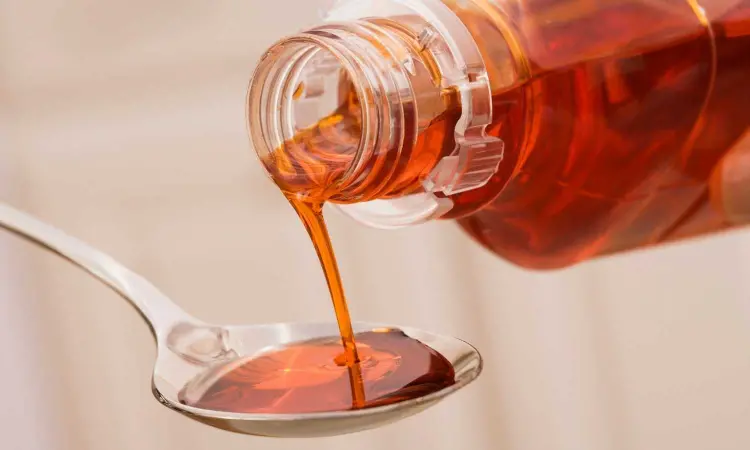- Home
- Medical news & Guidelines
- Anesthesiology
- Cardiology and CTVS
- Critical Care
- Dentistry
- Dermatology
- Diabetes and Endocrinology
- ENT
- Gastroenterology
- Medicine
- Nephrology
- Neurology
- Obstretics-Gynaecology
- Oncology
- Ophthalmology
- Orthopaedics
- Pediatrics-Neonatology
- Psychiatry
- Pulmonology
- Radiology
- Surgery
- Urology
- Laboratory Medicine
- Diet
- Nursing
- Paramedical
- Physiotherapy
- Health news
- Fact Check
- Bone Health Fact Check
- Brain Health Fact Check
- Cancer Related Fact Check
- Child Care Fact Check
- Dental and oral health fact check
- Diabetes and metabolic health fact check
- Diet and Nutrition Fact Check
- Eye and ENT Care Fact Check
- Fitness fact check
- Gut health fact check
- Heart health fact check
- Kidney health fact check
- Medical education fact check
- Men's health fact check
- Respiratory fact check
- Skin and hair care fact check
- Vaccine and Immunization fact check
- Women's health fact check
- AYUSH
- State News
- Andaman and Nicobar Islands
- Andhra Pradesh
- Arunachal Pradesh
- Assam
- Bihar
- Chandigarh
- Chattisgarh
- Dadra and Nagar Haveli
- Daman and Diu
- Delhi
- Goa
- Gujarat
- Haryana
- Himachal Pradesh
- Jammu & Kashmir
- Jharkhand
- Karnataka
- Kerala
- Ladakh
- Lakshadweep
- Madhya Pradesh
- Maharashtra
- Manipur
- Meghalaya
- Mizoram
- Nagaland
- Odisha
- Puducherry
- Punjab
- Rajasthan
- Sikkim
- Tamil Nadu
- Telangana
- Tripura
- Uttar Pradesh
- Uttrakhand
- West Bengal
- Medical Education
- Industry
Indian drugmaker denies syrup exported to Liberia is toxic

New Delhi: An Indian maker of a paracetamol syrup that Nigerian authorities have found toxic told Reuters on Tuesday that tests by a private Indian laboratory found them of "standard quality", as Indian authorities launch their own investigation.
Nigeria's National Agency for Food and Drugs Administration and Control (NAFDAC) said in an alert last week that samples of the Indian-made paracetamol suspension, Para Clear, exported to Liberia last year contained the toxin ethylene glycol. It also failed the requirement for "acute oral toxicity with five deaths of the laboratory animals recorded", the agency said.
Many Indian-made drugs have been found to have contained ethylene glycol and similar toxin diethylene glycol since last year, which the World Health Organization (WHO) have linked to the deaths of dozens of children in Gambia and Uzbekistan. The toxins are commonly used in brake fluid and other products not meant for human consumption.
"There is no possibility at all of finding ethylene glycol or diethylene glycol in our product," said Jaimik Patel, a director at Curis Lifesciences, based in the western Indian city of Ahmedabad and whose products were sold in Liberia.
"We are challenging the claim that our product was toxic."
A test of a sample of the medicine conducted by privately run Vaibhav Analytical Services in Ahmedabad on Saturday, and seen by Reuters, said the syrup had less than 0.1% of ethylene glycol and diethylene glycol.
"The sample referred ... IS OF standard quality," the test report from the Ahmedabad-based laboratory said.
Trace amounts of less than 0.1% of ethylene glycol and diethylene glycol in medicines are not considered toxic, according to the WHO.
NAFDAC, in its alert, did not give a toxicity concentration figure but said ethylene glycol was a "toxic substance that is not expected in product formulations". It did not immediately respond to a request for comment.
Patel said officials from India's federal drug regulator, the Central Drugs Standard Control Organisation, also picked up the sample for their own investigation. He said Curis had shared the test results and other documents with the regulator and the WHO.
Mumbai-based drug exporter Synercare told Reuters it had shipped two batches of nearly 20,000 Curis-made Para Clear bottles each to Liberia in October. Synercare's exports manager Dipesh Ajmera and Patel said Liberian authorities have now revoked the permission for the sale of all Curis products, including painkillers paracetamol and ibuprofen and antibiotic medication azithromycin.
Ajmera said Liberian authorities were set to destroy one batch of the paracetamol syrup last year as the drug's colour did not match that of a comparable product. The paracetamol suspension was supposed to be reddish brown but on physical verification, it was found to be reddish pink, Ajmera said.
Keturah Smith-Chineh, head of the Liberia Medicines and Health Products Regulatory Authority, told Reuters the syrups were to be incinerated because of the colour variation but it was tested in Nigeria at the request of the medicine's local importer.
"We plan to incinerate all the ... stock that came into Liberia," she said. "There are two other child medications from that manufacturer and we are working on recalling them."
Read also: Gambia probes suspected paracetamol syrup link to dozens of child deaths
Ruchika Sharma joined Medical Dialogue as an Correspondent for the Business Section in 2019. She covers all the updates in the Pharmaceutical field, Policy, Insurance, Business Healthcare, Medical News, Health News, Pharma News, Healthcare and Investment. She has completed her B.Com from Delhi University and then pursued postgraduation in M.Com. She can be contacted at editorial@medicaldialogues.in Contact no. 011-43720751


